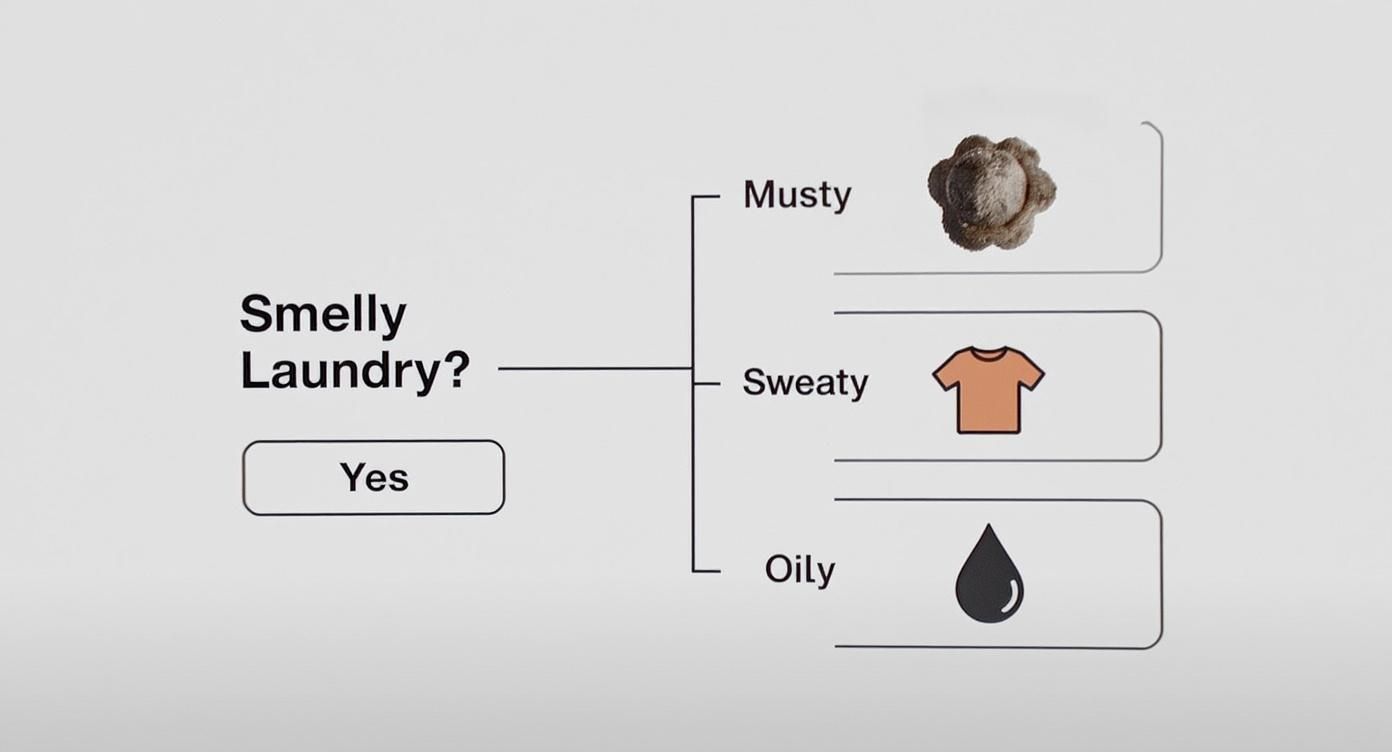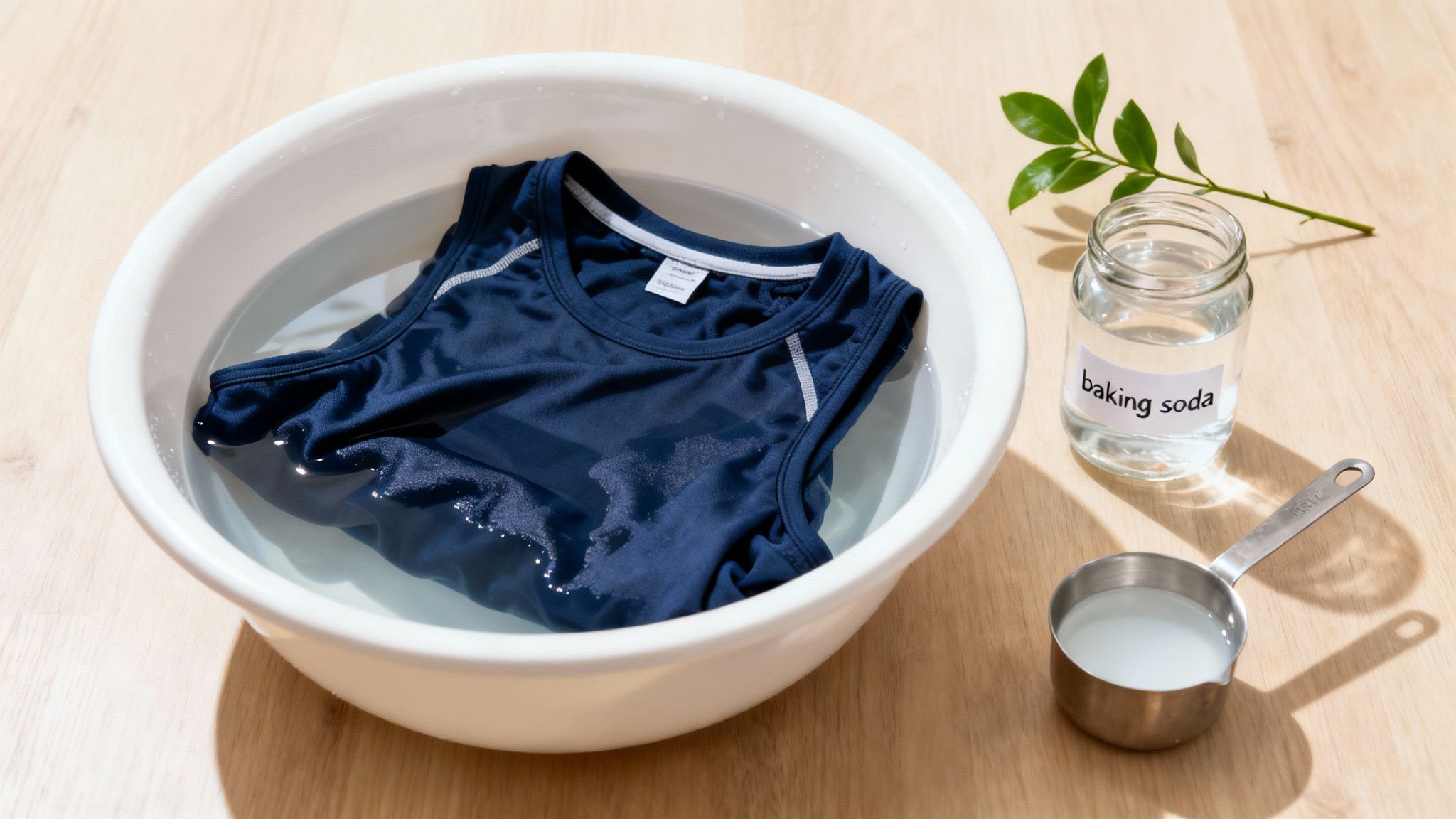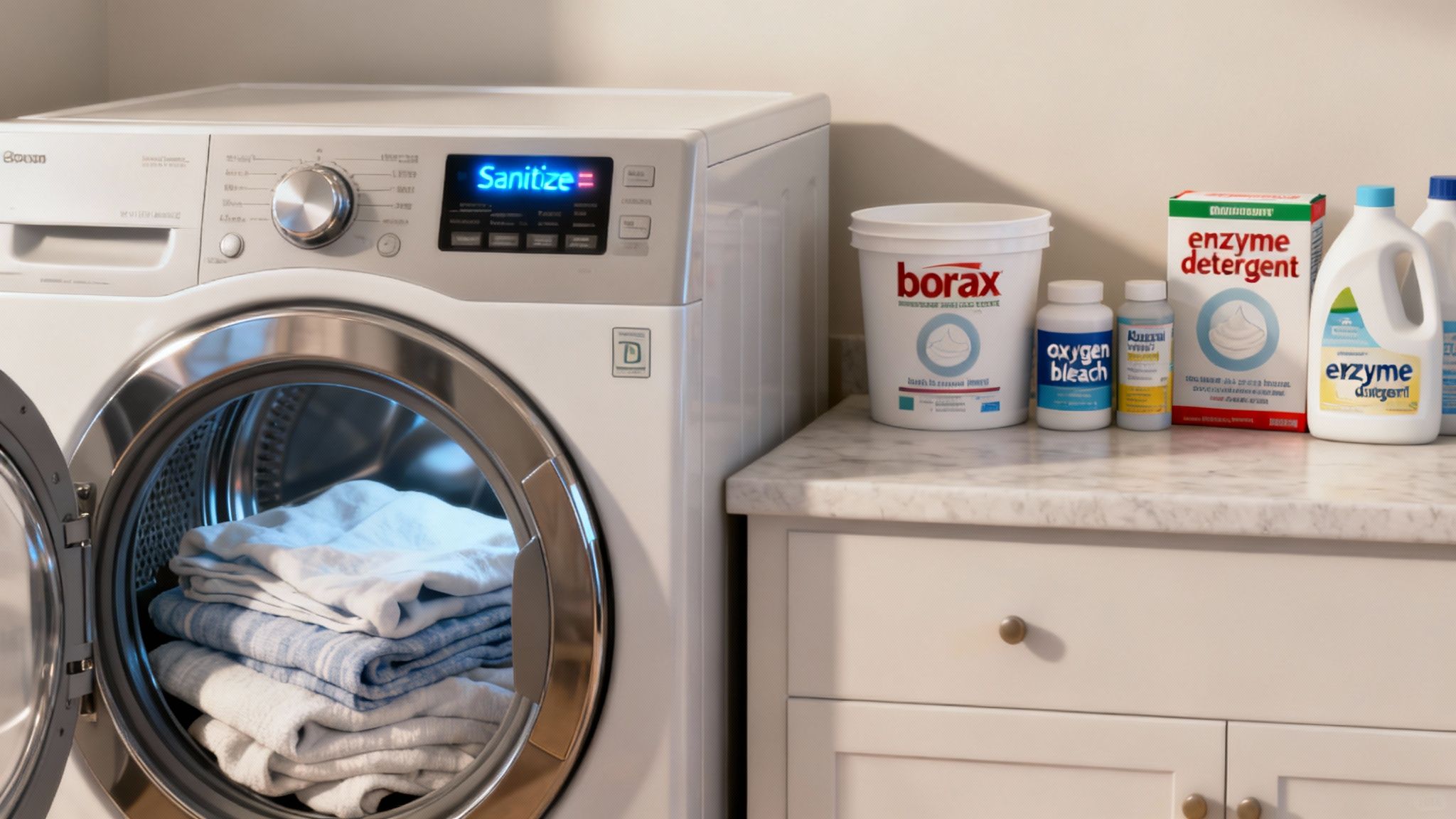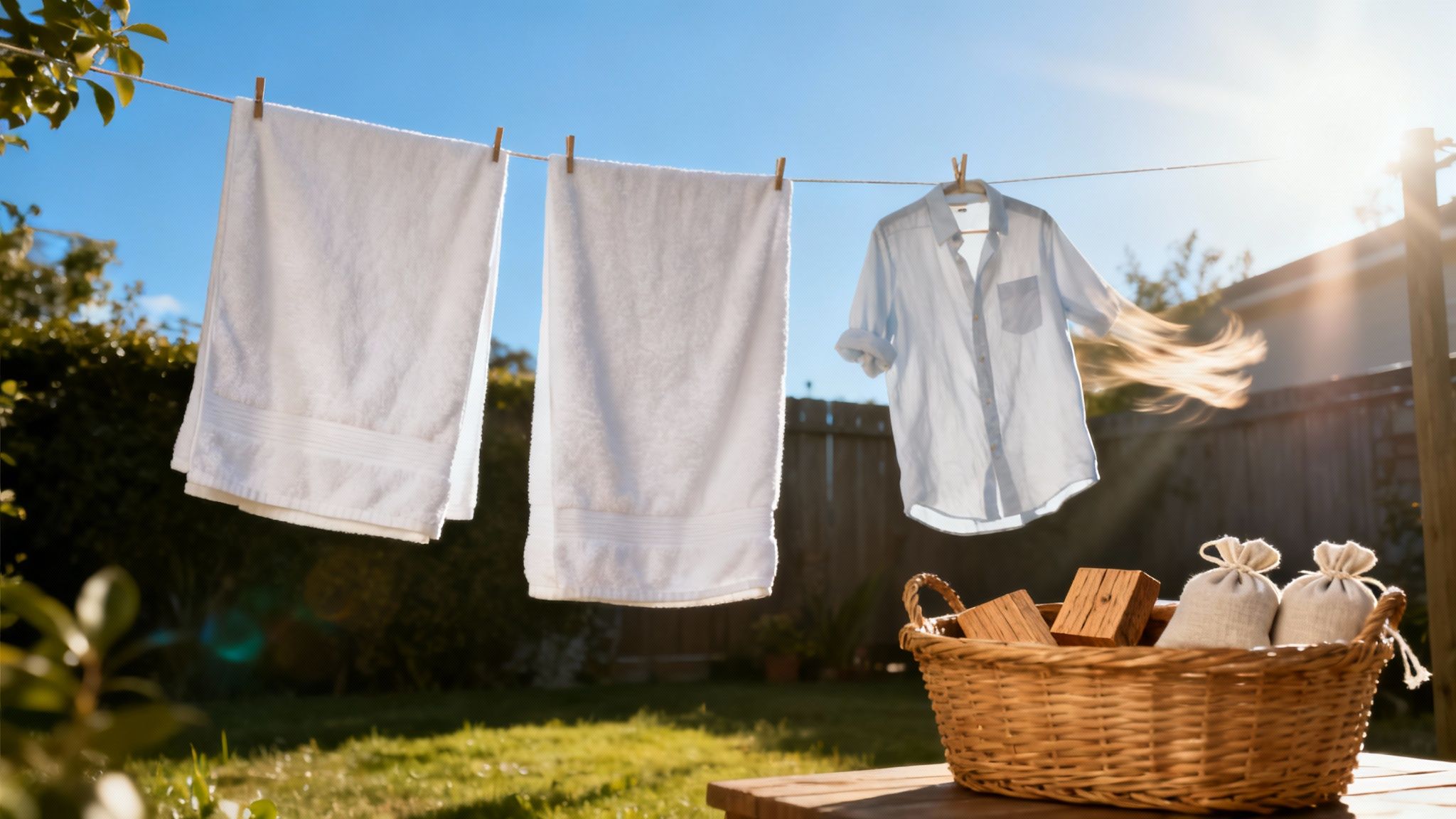How to Remove Odors from Laundry: A Phoenix Guide to Fresh Clothes
- Sarah Huber
- Nov 1
- 12 min read
A standard wash cycle sometimes isn't enough to eliminate stubborn laundry odors. The secret to truly fresh clothes is neutralizing the bacteria and oils trapped deep within fabric fibers. This requires targeted treatments like vinegar soaks or specialized detergents, both before and during the wash, to break down the root cause of the smell.
For busy residents and businesses in Phoenix, achieving perfectly fresh laundry is simple. GoGet My Laundry offers professional wash and fold laundry service with free pickup and delivery, ensuring your clothes are impeccably clean and odor-free, every time.
Understanding Why Clean Laundry Still Smells
Have you ever pulled a "clean" load from the washer, only to be met with a musty or sour smell? This common frustration occurs when a typical wash routine can't defeat the microscopic culprits behind the odor. Detergent alone is often insufficient to break down the deep-set bacteria, body oils, and mold spores bonded to the fabric.
The science is straightforward: our bodies produce sweat and oils that seep into clothes. If left to sit, bacteria feed on this organic matter, creating unpleasant smells. This is a significant issue with synthetic activewear, which is notorious for trapping odor-causing bacteria.
The Most Common Odor Culprits
The first step to fixing the problem is identifying the type of smell you're dealing with, as different odors require different treatments. The mildew on damp towels needs a different approach than the sweat smell clinging to gym clothes. Each odor tells a story about what’s happening at a microbial level.
This infographic can help you trace common laundry odors back to their likely source.

The problem usually boils down to microbial growth (like mildew), organic compounds (like sweat), or chemical residues (like oils).
To make it even clearer, here's a quick-reference table to help you pinpoint the cause.
Common Laundry Odors and Their Sources
Odor Type | Primary Cause | Commonly Affected Items |
|---|---|---|
Musty/Mildew | Mold and mildew growth from prolonged dampness. | Towels, gym clothes, clothes left in the washer. |
Sour/Stale | Bacterial growth on body oils and sweat. | T-shirts, workout gear, bedding. |
Greasy/Oily | Kitchen oils, lotions, or mechanical grease. | Aprons, kitchen towels, work uniforms. |
Smoke | Trapped smoke particles from cigarettes or fires. | Jackets, jeans, anything worn around smoke. |
This table should help you quickly diagnose the issue and choose the right treatment for the job.
Factors That Contribute to Lingering Smells
Several factors can cause your laundry to hold onto bad smells, even with a good detergent. If you can spot these issues in your routine, you’re already halfway to fresher results.
A Dirty Washing Machine: Your washer can be a breeding ground for mold, mildew, and detergent buildup. This gunk can transfer a musty smell to every load you wash.
Overloading the Machine: Clothes need room to tumble freely for water and detergent to circulate effectively. Stuffing the machine full traps dirt and bacteria.
Using the Wrong Amount of Detergent: Too much detergent leaves a soapy film that attracts more grime, while too little won't break down oils and soils effectively.
These issues are why many people seek better solutions than standard detergents.
Key Takeaway: A lingering odor in your laundry isn't a sign that you're unclean—it's just proof that bacteria and oils have survived the wash. The fix is to attack the root cause, not just pile on more fragrance.
Getting a handle on these underlying problems is crucial. If you've ever felt like your laundry is mocking your best cleaning efforts, it's worth exploring common mistakes. You can get the full rundown in our guide about why your clothes are laughing at you.
Winning the War on Odors Before the Wash Cycle Begins

The battle against stubborn smells is often won before you press the 'start' button. Tossing funky clothes into the machine and hoping for the best is a recipe for disappointment, as detergent alone often can't penetrate deeply embedded oils and bacteria.
This is where a targeted pre-soak comes in. Letting your clothes soak in the right solution gives cleaning agents time to break down the compounds causing the odor. A simple vinegar soak, for instance, starts neutralizing mildew on towels long before they see the inside of your washer.
Mixing the Perfect Pre-Soak for the Job
Not all odors are created equal, so you need to tailor your pre-soak to the specific smell. This approach delivers the best results and helps protect your fabrics in the process.
Here are a few go-to recipes for common laundry smells:
Musty Towels & Mildew: Mix one part distilled white vinegar with four parts cold water in a sink or tub. Submerge the musty items and let them soak for at least 30 to 60 minutes. The acetic acid in vinegar is a powerhouse against mold.
Sweat & Body Odor: Dissolve a half-cup of baking soda in a gallon of cool water and let smelly garments soak for a few hours or overnight. Baking soda is a natural deodorizer that works wonders on acidic smells.
Greasy or Oily Smells: For kitchen towels or work clothes, an enzyme-based detergent is your best friend. Follow the label's instructions for pre-soaking, which usually involves dissolving some detergent in water before adding the clothes.
These treatments target the chemical source of the odor, breaking it down so your regular wash cycle can easily rinse it away. These soaks often help with stains, too. For a deeper dive, check out our Phoenix laundry guide on how to remove stains from clothes.
A Few Pro-Tips for Pre-Treating
To get the most out of your pre-soak, follow a few best practices. These simple steps ensure you're getting rid of the smell without accidentally damaging your clothes.
Always do a spot test on a hidden area before submerging a garment, especially if it's brightly colored or delicate. Also, a critical safety note: never mix vinegar with chlorine bleach, as the combination creates toxic gas.
My Favorite Trick: For really stubborn smells on tough fabrics like workout shirts, make a thick paste with baking soda and a little water. Rub it directly into the problem areas, like the underarms, and let it sit for about 15 minutes before tossing the garment into the soak.
Once items have soaked long enough, let the water drain and transfer the damp clothes straight into the washing machine. Wash as you normally would with a quality detergent for a reliable path to truly fresh, clean-smelling laundry.
Getting the Most Out of Your Wash Cycle to Eliminate Odors

After pre-treating tough odors, the main wash is your chance to finish the job. Your washing machine is a workhorse, but you need to be strategic with your settings to conquer stubborn smells.
Think of it this way: water temperature, load size, and the right detergent are your three main tools. A few simple tweaks can turn a standard wash into an odor-destroying mission.
Dialing in the Right Water Temperature
Water temperature is one of your best weapons against smelly laundry, but the wrong temp can set stains or damage fabrics.
Hot Water (130°F or higher): This is your sanitizing powerhouse, reserved for durable items like cotton towels, bed sheets, and white socks. The heat is brilliant at killing bacteria and dust mites.
Warm Water (90°F to 110°F): This is the sweet spot for most laundry, including synthetic fabrics like activewear. It’s hot enough to dissolve detergent and break down body oils without a high risk of damage.
Cold Water (Below 80°F): Cold is the go-to for anything delicate, brightly colored, or lightly soiled. Pair it with a detergent specifically formulated for cold-water washing for best results.
When in doubt, always check the care label on your clothes. It’s the ultimate guide to keeping your garments clean without ruining them.
Choosing a Detergent That Fights Odors
For tackling odors, your secret weapon is a detergent that contains enzymes. These are powerhouses designed to break down the sources of smells like sweat and body oils. Look for words like protease (for proteins), amylase (for starches), and lipase (for fats) on the label.
The global laundry detergent market is actually expected to hit $294.74 billion by 2032, and for good reason. Liquid detergents are the top pick in over 70% of households, largely because they're so easy to use. There's also a big shift toward eco-friendly and hypoallergenic formulas as people get more conscious about ingredients. You can explore more insights into detergent market trends if you're curious about where the industry is headed.
Pro Tip: Don't cram your washing machine full! Clothes need room to tumble for the water and soap to get into every fiber. An overstuffed machine is the fastest way to get a mediocre clean that leaves smells behind.
Give Your Wash a Boost
Sometimes, even a great detergent needs a helping hand. Laundry boosters work alongside your detergent to neutralize odors and cut through stubborn grime.
Here are a couple of my favorite, easy-to-find options:
Oxygen Bleach: Unlike harsh chlorine bleach, oxygen bleach is generally color-safe. It releases oxygen bubbles that break apart stains and kill odor-causing bacteria.
Borax: This old-school staple is a naturally occurring mineral that softens hard water, which helps your detergent clean more effectively. It also stops mildew growth and neutralizes acidic odors.
By picking the right temperature, using an enzyme-packed detergent, and adding a booster when needed, you create an environment that actively destroys bad smells.
Drying and Storing Clothes to Lock in Freshness

If you fumble the handoff from the washer to the dryer, all your hard work can go to waste. Drying isn't just about removing water; it's your last chance to knock out stubborn bacteria and your first defense against new smells.
The journey from washer to dryer is critical. Leaving wet clothes to sit in the machine, even for a short time, is an open invitation to mildew. The single most important habit is to move your laundry over immediately.
Getting the Most Out of Your Drying Method
Whether you use a machine or a clothesline, the mission is to get your clothes completely and efficiently dry. Each method has its own benefits for keeping things fresh.
Line-drying in the Arizona sun is nature’s free sanitizer. The sun’s UV rays are surprisingly effective at killing off lingering odor-causing microbes, and nothing beats the smell of clothes aired out by a natural breeze.
If you're using a machine, high heat works wonders for sanitizing tough items like cotton towels, but medium or low heat is better for most of your wardrobe. The absolute non-negotiable rule is to ensure every item is 100% dry before folding, paying close attention to thick spots like waistbands.
Smart Storage for Long-Lasting Freshness
How you store your laundry determines how long that fresh feeling lasts. A jam-packed closet with no room to breathe is a recipe for stale, musty clothes.
The secret ingredient for fresh storage is airflow. Try not to cram your drawers and closet so full that air can't move around. This one small change prevents that trapped, stuffy smell from developing.
For an extra boost of freshness, a few natural fresheners can make a huge difference.
Cedar Blocks or Hangers: Cedar naturally repels moths and absorbs moisture, leaving a subtle, clean scent.
Lavender Sachets: A small bag of dried lavender tucked into a drawer keeps things smelling lovely for months.
Activated Charcoal Bags: These are odor-absorbing powerhouses that neutralize smells without leaving a scent of their own.
Key Takeaway: How you dry and store your clothes is just as important as how you wash them. Getting them out of the washer right away prevents mildew, and giving them breathing room in the closet keeps them smelling fresh until you’re ready to wear them.
If your schedule makes it tough to stay on top of these final steps, a professional service is a lifesaver. At GoGet My Laundry, our professional-grade equipment and meticulous process lock in that fresh-from-the-laundry feeling, saving you time and effort. For residential and commercial laundry service in Phoenix, contact GoGet My Laundry today.
When It's Time to Call in the Laundry Pros
While home remedies work wonders on everyday smells, some laundry challenges are beyond a home washing machine's capabilities. That’s when you need to call for backup.
For deeply embedded odors, delicate fabrics, or valuable items, a botched DIY attempt can do more harm than good. A professional service is the safest bet for protecting your clothes. For folks in the Phoenix area, GoGet My Laundry is that expert backup, using commercial-grade equipment and specialized cleaning agents to knock out the toughest odors.
When Your Best Efforts Just Aren't Cutting It
Some smells are notoriously difficult to banish with home remedies. Trying to treat them without the right tools can sometimes drive the odor deeper into the fabric.
Consider handing these problems over to a professional:
Heavy Smoke Saturation: Smoke particles worm their way deep into fabrics. Professionals use specific deodorizing treatments that a home washer can't replicate.
Heirloom or Delicate Textiles: An antique tablecloth or silk blouse is too fragile for aggressive washing. An expert knows how to clean these items gently.
Persistent Mildew in Bulky Items: Comforters and duvets trap moisture, leading to musty smells. Our commercial machines ensure a deep clean and a completely dry finish.
Chemical or Gasoline Odors: These can be hazardous and require specific solvents and handling procedures best left to trained professionals.
The Professional Edge for Local Businesses
For businesses in Phoenix—from medical clinics to hotels—fresh, odor-free linens are a requirement. GoGet My Laundry provides custom solutions for industries where cleanliness is part of the brand promise. Our commercial laundry service starts at just $1.39 per pound and includes reliable, scheduled pickups.
Consumers care deeply about freshness. The market for odor-control textiles is expected to hit $2.86 billion by 2033, with up to 60% of consumers actively seeking out clothes with these features. This trend underscores how critical it is for businesses to deliver an impeccably fresh experience. You can read more about the rise of odor control textiles here.
A Pro's Perspective: Think of professional laundry services as restoration experts, not just cleaners. They use controlled processes and targeted treatments to rescue items you might have thought were ruined, saving both their financial and sentimental value.
DIY vs. Professional Odor Removal
Knowing when to tackle an odor yourself and when to call for help can be tricky. Here’s a quick comparison to guide your decision.
Scenario | Recommended DIY Method | When to Call a Professional |
|---|---|---|
Everyday Sweat | Pre-soak with vinegar or baking soda; wash with an enzyme detergent. | If the odor persists after several attempts, especially in pricey activewear. |
Musty Towels | Wash on a hot cycle with vinegar or oxygen bleach. | When the musty smell returns quickly or affects a large batch of linens. |
Light Smoke | Air out items outdoors; wash with a deodorizing detergent. | For heavy, set-in smoke smells that saturate the entire garment. |
Delicate Fabrics | Hand wash with a gentle detergent and cool water. | Always, if the item is valuable, antique, or has sentimental importance. |
In the end, choosing a professional service is about getting guaranteed results and saving yourself the headache. You can learn more about what to expect from your professional laundry service in our detailed guide. When you’re up against a truly tough odor, GoGet My Laundry is ready to step in. Experience the easiest way to do laundry — book your pickup now.
Got Laundry Odor Questions? We've Got Answers.
Even with a solid laundry routine, some stubborn smells and tricky situations can pop up. We get these questions all the time from folks around Phoenix, so let's clear up a few common laundry mysteries.
Can I Just Bleach All My Smelly Clothes?
It’s tempting to reach for chlorine bleach as the ultimate power move, but it is a specific tool, not a cure-all. It's fantastic for disinfecting and whitening sturdy, white fabrics like cotton towels and sheets.
For anything else, it's a huge risk. Bleach can strip color from clothes and damage delicate fibers like wool or silk. For most items, oxygen bleach or a simple white vinegar soak is a much safer, more versatile bet.
A Pro's Rule of Thumb: Always check the care tag first. If you're unsure, don't risk it. For a precious item with a stubborn odor, call in the pros. A service like GoGet My Laundry uses specialized treatments that tackle the smell without destroying the fabric.
Why Do My Gym Clothes Still Stink After Washing?
The dreaded "perma-stink" on workout gear is one of the most common complaints. Your high-tech activewear is made of synthetic fibers designed to repel water but attract and hold onto body oil.
Those oils trap odor-causing bacteria deep within the tightly woven fibers. To get them clean, you need to change your game plan.
Soak Them First: A 30-minute pre-soak in one part white vinegar and four parts cold water starts to break down bacteria and oils before the wash.
Use the Right Detergent: Look for a "sport" detergent formulated with enzymes designed to break down sweat and body oil on synthetic fabrics.
Ditch the Fabric Softener: Fabric softeners coat fibers with a waxy film that clogs the fabric's pores, trapping smells in and ruining its moisture-wicking ability.
Could My Washing Machine Be the Real Problem?
Yes, absolutely. Your washing machine can easily become a breeding ground for musty odors from detergent residue, leftover dirt, and fabric softener buildup. This gunk creates a biofilm that is a perfect home for mold and mildew, which then transfers a sour smell to your clothes.
Regular maintenance is essential. Once a month, run an empty cycle on the hottest setting with two cups of white vinegar or a dedicated cleaner. Most importantly, leave the washer door open after you're done to let the inside air dry completely.
Hot or Cold Water: Which is Better for Smells?
The right water temperature depends on the fabric type and how bad the smell is. Hot water (130°F or higher) is best for sanitizing durable items like cotton towels and bedding.
For most clothes, activewear, and colored items, warm or even cold water is the way to go to prevent fading and damage. In those cases, the secret weapon isn't the heat—it's using a great enzyme detergent and doing a proper pre-soak.
When you're faced with odors that just won't quit, GoGet My Laundry is your simple, professional solution in the Phoenix area. We handle the tough stuff so you can get back to your life, offering reliable service starting at just $1.69 per pound for residential customers, with free pickup and delivery.
Ready for a break? Schedule your laundry pickup today.
Article created using Outrank

Comments